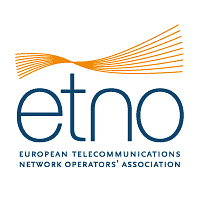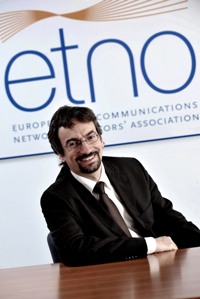 Javier Serina/ @javseri
Javier Serina/ @javseri
Public Policy Manager of Telefónica
 Thierry Dieu, acting Director of ETNO and media spokesperson of this association, has a broad experience as communication expert within the European Commission, both in Brussels and previosly in its delegation in Moscow, and as Communication Manager of the Confederation of the Food and Drink Industries of the EU (CIAA). He has been succesfully leading all ETNO media campaigns during the last years, achieving two nominations for the European Public Affairs best campaign award in 2008 and 2010. We from Telefónica (TEF) recently met with him, to learn more about ETNO and his views on ICT and the hot issues which are handled at this key association representing “Europe’s leading e-communications services and networks providers”.
Thierry Dieu, acting Director of ETNO and media spokesperson of this association, has a broad experience as communication expert within the European Commission, both in Brussels and previosly in its delegation in Moscow, and as Communication Manager of the Confederation of the Food and Drink Industries of the EU (CIAA). He has been succesfully leading all ETNO media campaigns during the last years, achieving two nominations for the European Public Affairs best campaign award in 2008 and 2010. We from Telefónica (TEF) recently met with him, to learn more about ETNO and his views on ICT and the hot issues which are handled at this key association representing “Europe’s leading e-communications services and networks providers”.
TEF: Good morning Thierry, what is ETNO?
TD: ETNO is the trade association representing Europe’s leading e-communications services and networks providers and a priviledged interlocutor of the EU institutions for all issues pertaining to the Information Society. Our 40 members in 35 European countries are pan-European operators, offering voice and data over mutliple platforms. They account for a total turnover of about €250 billion, 70% of total investment and one million employees.
TEF: What do you do for the ICT industry?
TD: ETNO aims to create an appropriate commercial and regulatory framework allowing its members to continue to innovate and respond to consumers’ demands. ETNO contributes to raising awareness about the rapidly changing realities of the ICT sector and about the role e-communications can play in addressing key challenges for society. ETNO has for example helped putting Next Generation Access Networks, and their positive impact on the economy, at the top of the policy agenda. The need to accelerate NGA deployment is fully reflected in the Digital Agenda for Europe.
TEF: What kind of issues and organisations do you cover?
TD: ETNO closely follows policy developments in all areas which touch upon the Information Society and the e-communications sector, including economic regulation, trade issues, data protection, security, online content, etc. The role that ICT applications and networks can play in addressing key issues for our society such as climate change or ageing population, is also a key priority for ETNO. Our main interlocutors are the European Commission (mainly DG INFSO, but also DG Markt, DG Enterprise, DG COMP, DG Justice and DG Home Affairs), European Parliament, Council of Ministers, ITU, ICANN (click here for more detailed info)
TEF: What are your main objectives for 2011?
TD: The main objectives of ETNO are linked to the targets of the Digital Agenda of the European Commission which aims to deploy basic broadband networks for all by 2013 and up to 30 Mbps for all households by 2020, providing half of them with up to 100 Mbps. In order to achieve these objectives, ETNO aims to create the best conditions for private investment in Next Generation Access networks, namely by applying more proportionate and targeted regulation, encouraging a more sustainable economic model for the Internet, opening up additional spectrum to mobile and wireless networks. To encourage private investment, measures that stimulate consumer take up are also needed. In this context, ETNO also focuses on the creation of a digital single market for online content though a simplification of copyright and licensing regimes.
TEF: What are the current challenges/hot topics concerning the future of ICT in Europe?
TD: Our sector is faced with a rapid and unprecedented growth of data traffic driven mainly by “over the top” applications and services, calling for ever more bandwidth capacity and speed. At the same time this increase in traffic is not benefiting those who have to invest in new capacity and infrastructure. On the contrary e-communications network operators see their revenue going down. Addressing this disconnect is key not only for the Digital Agenda but for the future of Europe. It is therefore critical to encourage the development of new business models which would stimulate all the players to contribute to the challenges ahead. Operators should also be abe to develop differentiated retail offers taking into account consumer needs. The deployment of high speed broadband networks is an essential condition for European citizens and businesses to continue benefiting from the Internet. It is essential to find a way to encourage private investment in new networks.
TEF: The governance model of Internet is under discussion in different fora. What is the position of ETNO in this matter?
TD: The success of the Internet so far is due to the fact that it has been private sector driven. The mutli-stakeholder Internet Governance model should be retained and improved. It is important that no one – or any – government entity has control over the Internet. Fora such as the IGF and ICANN have an important role to play in ensuring multi-stakeholder participation.
TEF: Are you present in Social Media? How do these tools help you in your day-to-day work? What do you think are their effects for policy-making in Brussels?
TD: ETNO is present on Linkedin and on Twitter. These tools represent extra ways of channelling information to key audiences but also to get insight from different stakeholders on policy developments. Social networking sites are playing an increasing role in lobbying in Brussels. They are complementary to traditional media and are increasingly used as a vehicle to launch new campaigns or events. With a new generation of digital natives who are increasingly embracing these new tools, it is evident that social networking sites will soon stop being a “nice to have” tool but will become an intrisic part of the policy making scene and probably an actor in the process in itself.
TEF: How do you personally think will ICT industry look like in the year 2020?
TD: The ICT industry is probably the most difficult sector in term of provisions. Ten years ago, who would have predicted the success of applications such as VoIP or social networking sites? We believe in ETNO that technological evolution will continue to drive competition. People will access high speed broadband from many parallel platforms and devices, although in some remote or rural areas, mobile networks will have offered a viable alternative to fixed ones for high speed access. Highly performing home applications such as HD television and gaming will drive high speed fibre connections take up but also increasingly e-health and independent living applications, teleworking solutions. Increasing energy prices will also stimulate people to embrace broadband-enabled solutions to manage and optimise their energy consumption. On the market side, we will continue to see more cross-border integration and the emergence of more pan-European operators. In line with technological convergence, synergies between e-communications operators and actors from other segments of the ICT industry and other sectors of the economy are likely to develop.
Thierry Dieu, ETNO.








